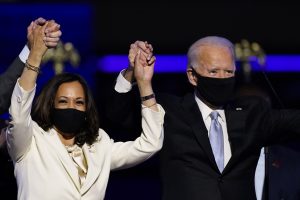After keeping silent for over a week, China has finally congratulated Joe Biden on winning the U.S. presidential election – in the most circumspect way possible.
The statement came not in the form of a message from President Xi Jinping himself, much less a phone call, as a number of other world leaders have had with the U.S. president-elect. Instead, the delayed congratulations came in a short comment at the end of a regular Foreign Ministry press conference.
“We have been paying attention to the reactions to this U.S. presidential election both from within the United States and from international society,” spokesperson Wang Wenbin said. “We respect the choice of the American people. We express congratulations to Mr. Biden and Ms. Harris.”
Technically, Wang didn’t explicitly say that Biden had won the election or was the president-elect; he simply “expressed congratulations” – and left unsaid why Biden and Harris were being congratulated. And immediately after, Wang repeated his comment from November 9 that “We understand the presidential election result will be determined following the U.S. laws and procedures” – an implicit nod to incumbent President Donald Trump’s continued efforts to overturn the results through legal action.
In an extra note of caution, even the question – asked by a reporter from The Paper, a state-owned news outlet – provided cover for Wang, by pointedly mentioning that “many international leaders” (including the U.N. secretary general) had congratulated Biden on his election victory.
Compare that to the response from some of China’s neighbors. Both Japanese Prime Minister Suga Yoshihide and South Korean President Moon Jae-in tweeted out their personal congratulations to Biden and Harris. Both added that they “look forward to working with” Biden and Harris, a clear acknowledgement that the two will lead the next U.S. government. Taiwan’s President Tsai Ing-wen posted a similar message on Twitter, expressly congratulating Biden and Harris “on being elected President & VP-elect.” In all three cases, the foreign ministers also issued congratulations; South Korea’s Foreign Minister Kang Kyung-wha went a step further, meeting with Biden allies during her trip to Washington D.C. this week. Moon and Suga have both held phone calls with Biden as well.
As I wrote earlier this week, China appears reluctant to reach out to Biden, lest that be misconstrued as taking a side in a U.S. domestic political fight. Trump continues – without evidence – to insist that the vote was fraudulent, and is contesting the legitimacy of vote counts in court. But with the chances of success looking slimmer and slimmer – especially as another closely contested state, Arizona, was called for Biden today – Beijing may have decided it’s safe to take the baby step of having a spokesperson offer pro forma congratulations.
Chinese leaders may also have calculated that at this point, not congratulating Biden could lend the impression that Beijing supported Trump. Wang’s decidedly low-profile announcement will be enough to take China off the list of governments that haven’t offered congratulations (among the continued hold-outs: Russia, Brazil, and Mexico). But this is a far cry from Xi offering formal congratulations, and that’s important to note. China may be hoping that its latest announcement will assuage concerns from the Biden camp but still fly under Trump’s radar. After all, come what may, Trump will remain president until January 20, 2021.

































